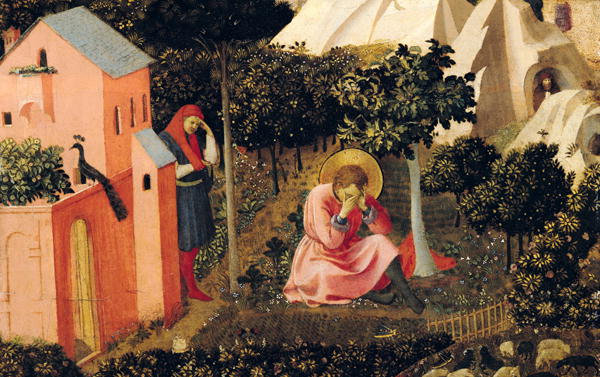Raymond Lam
Some scientists and psychologists draw parallels between religious experiences and psychological illnesses and conditions, like epilepsy. We’re not just talking about feelings of lovingkindness or compassion generated in meditation, but ecstatic visions of angels or hearing thundering voices of celestial beings. Drawing parallels between mental illness and religious ecstasy is pretty politically incorrect, as one can imagine. I also don’t believe in the efficacy or the necessity of these experiences, though for completely different reasons to religious skeptics. I take after my theological hero Saint Augustine, who believed that such experiences handicapped the genuine spiritual life.
I encountered Augustine’s Confessions in a 2007 course on the philosophy of autobiography. He went on a rigorous intellectual journey during his youth, comparing the merits of different traditions with each other, like those of Manicheanism with Catholicism. The revelation that compelled him to convert is well-known: wracked with a growing conviction in Christianity yet unable to fully surrender, he heard a child’s voice in the garden to “Take up and read!” or in Latin, Tolle, lege!” He saw this as a divine command to open the Bible and read the first passage he saw: Romans 13:13–14.
Most scholars agree that Augustine’s encounter with the child’s voice was a genuine case of rapture, rather than what some speculate to be just dramatic language or metaphor. Yet few know how disappointed he was when such experiences didn’t transform his being into something more “Christ-like,” or give him new ways to relate with others. He later wrote unhappily that such moments of holy ecstasy could intersect with ego-driven activities like promoting oneself or delusions of grandeur. The experience itself might give someone a boost of ego, as if they are somehow special or unique. In Confessions he attested to the importance of personal experience (it worked for him, after all), then immediately downplaying it.
Like the Buddha, who warned about the rising pleasantness a meditator feels as she ascends the jhanas and urged disciples not to dwell too long in them, Augustine knew that visions and intensely religious experiences were not validations of the spiritual path. People who go through such mysterious, extraordinary psychic events too often attach the wrong kind of significance to them.
Augustine was right when he let go of his initial wonder at his ecstatic insight, and threw himself into the nitty-gritty of theology and philosophy. After converting he concerned himself with what the Church of Rome saw as correct worship, theology, and liturgy. These intellectual engagements are as much religious experiences as any vision or hearing of voices. In fact, I shudder at the mention of theory versus practice, that dreadfully false dichotomy that many Buddhist masters and scholars still promote (with good intentions). Though we often over-intellectualize, to me there is no actual dichotomy. Augustine reminds us that systematic thinking is also a fundamental part of the religious experience.
If reading Romans 13:13–14 was Augustine’s turning point, mine was Thomas Cleary’s translation of the Avatamsaka Sutra. It revealed the Mahayana cosmos as a universe in a single atom, with a Buddha in all universes and in every atom. Ironically, the cosmic insights of its nameless authors might well have been a result of intense visions that allowed them to see the universe with the eyes of a bodhisattva. I can’t hope to come close to Augustine’s intelligence and rigor of thought, but I think, after nearly a decade, I understand in bits and pieces what he meant intellectually and experientially, when he wrote: “Thou didst call, and cry, and burst my deafness.”


[…] experiences, nor at Guan Yin Temple. However, I’ve never cared to have any such experiences (see why I don’t see why spiritual experiences are a big deal here). What I feel matters is the sense of beauty and infinite preciousness that one feels when visiting […]